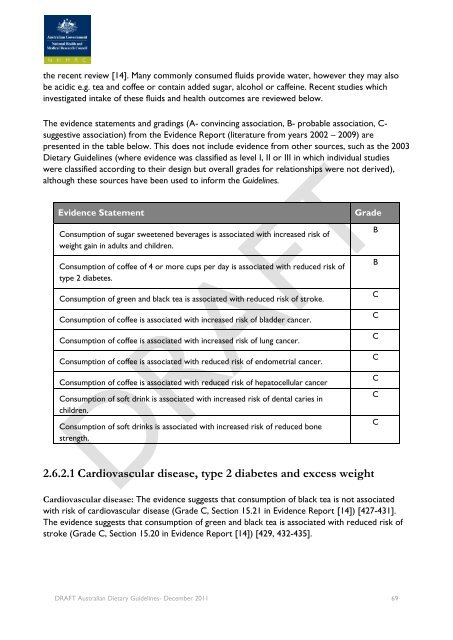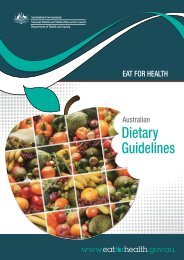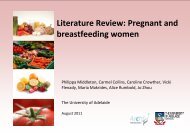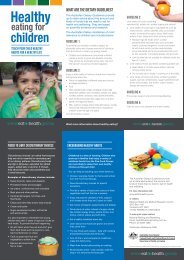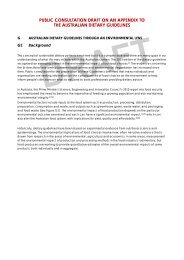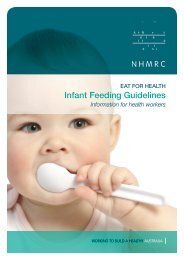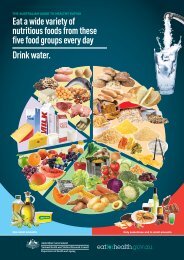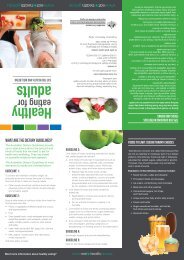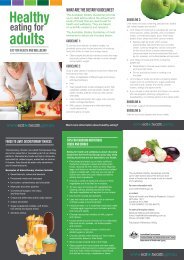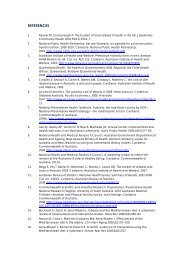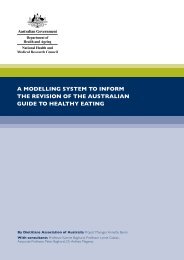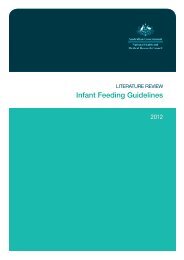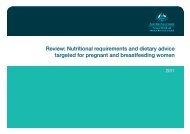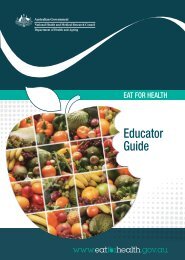- Page 4 and 5:
Australian Dietary GuidelinesAustra
- Page 6 and 7:
2.4.4 Practical considerations: Lea
- Page 8 and 9:
1. Introduction1.1 Why the Guidelin
- Page 10:
income, education, cultural influen
- Page 17 and 18:
The Food Modelling Report - transla
- Page 19 and 20: Potential mechanisms through which
- Page 21: adolescence predict diet quality an
- Page 24 and 25: Figure 1.2: Australian Guide to Hea
- Page 26 and 27: Executive SummaryDietary patterns w
- Page 28 and 29: Consuming a wide variety of foods m
- Page 30 and 31: varieties within each food group, f
- Page 32 and 33: 2.1.4.6 People in lower socioeconom
- Page 34 and 35: vegetable intake and cancer has foc
- Page 36 and 37: Endometrial, Ovarian and pancreatic
- Page 38 and 39: 2.2.3.2 CancerColorectal cancer: Ev
- Page 40 and 41: 2.2.4.2 CancerAlimentary tract canc
- Page 42 and 43: 2.2.5.2 Cancer mechanismsThere is n
- Page 44 and 45: Table 2.1: Recommended number of se
- Page 46 and 47: increasing appetites. Unless prescr
- Page 48 and 49: 2.3.2.1 Cardiovascular disease, typ
- Page 50 and 51: Table 2.3: Recommended number of se
- Page 52 and 53: 2.4 Lean meat and poultry, fish, eg
- Page 54 and 55: interpret because of widely varying
- Page 56 and 57: 2.4.2.3.1 Fish: Cardiovascular dise
- Page 58 and 59: Smoked, salted and chemically prese
- Page 60 and 61: Depending on age and sex, health be
- Page 62 and 63: 2.4.4.6 VegetariansFor several nutr
- Page 64 and 65: Evidence StatementConsumption of mo
- Page 66 and 67: 2.5.3 How drinking milk and eating
- Page 68 and 69: 2.5.4.1 Pregnant and breastfeeding
- Page 72 and 73: 2.6.2.3 Other conditionsDental cari
- Page 74 and 75: Where to nextBoth the quality and q
- Page 76 and 77: Executive summaryThis Guideline emp
- Page 78 and 79: 3.1.2 The evidence for ‘limiting
- Page 80 and 81: In the longer term, the review cond
- Page 82 and 83: The P:M:S ratio is a useful tool in
- Page 84 and 85: 3.2.2 The evidence for ‘limiting
- Page 86 and 87: 3.2.3 How limiting intake of foods
- Page 88 and 89: 3.2.4.4 Older peopleTaste perceptio
- Page 90 and 91: No large studies have measured the
- Page 92 and 93: Excess weight: Many foods containin
- Page 94 and 95: etter health outcomes than those wh
- Page 96 and 97: Evidence StatementConsumption of al
- Page 98 and 99: Dementia: The evidence suggests an
- Page 100 and 101: Drinking coffee, having a cold show
- Page 102 and 103: In the absence of any research to q
- Page 104 and 105: Executive summaryHealthy weight is
- Page 106 and 107: prevalence of obesity alone is high
- Page 108 and 109: Compared to having a BMI between 18
- Page 110 and 111: Kilojoules4.1.3.2 Energy intake and
- Page 112 and 113: 4.1.3.4 Energy intake from specific
- Page 114 and 115: 4.1.4.2 Benefits of physical activi
- Page 116 and 117: 4.2.1 Primary preventionDiet and ph
- Page 118 and 119: and consistent evidence that dietar
- Page 120 and 121:
4.2.2 Secondary preventionBehaviour
- Page 122 and 123:
Table 4.4 A stepped model for the m
- Page 124 and 125:
Taller or larger and more active ad
- Page 126 and 127:
Table 4.5 2010 Institute of Medicin
- Page 128 and 129:
For older, taller or more active ch
- Page 130 and 131:
Most older people will benefit from
- Page 132 and 133:
5. Encourage and support breastfeed
- Page 134 and 135:
5.1 Setting the sceneThe World Heal
- Page 136 and 137:
Evidence StatementExclusive breastf
- Page 138 and 139:
Table 5.1 Factors associated with d
- Page 140 and 141:
5.2.4 Other benefitsSudden Infant D
- Page 142 and 143:
5.3.1.3 Mothers in the workplaceEvi
- Page 144 and 145:
5.3.1.3 Community supportThe succes
- Page 146 and 147:
Executive summaryMore than five mil
- Page 148 and 149:
[929]. Fresh fruit and vegetables c
- Page 150 and 151:
contamination (see above) avoided.
- Page 152 and 153:
1989 - 1995 Composition of Foods, A
- Page 154 and 155:
2001 Eat Well Australia: An Agenda
- Page 156 and 157:
2011 A Review of the Evidence to Ad
- Page 158 and 159:
• Professor Dorothy Mackerras•
- Page 160 and 161:
• Level III-2 - A comparative stu
- Page 162 and 163:
food options to meet additional ene
- Page 164 and 165:
Appendix 3. Assessing growth andhea
- Page 166 and 167:
Table A3.1 International BMI cut-of
- Page 168 and 169:
A3.1.6 Z-scores and percentiles: Co
- Page 170 and 171:
Appendix 4. Physical activity guide
- Page 172 and 173:
Suggested activities include:• mo
- Page 174 and 175:
Appendix 5. Studies examining thehe
- Page 176 and 177:
that further specific studies are r
- Page 178 and 179:
Table A6.2 Energy and alcohol conte
- Page 180 and 181:
The economic, social and cultural f
- Page 182 and 183:
A diet consistent with the Guidelin
- Page 184 and 185:
In other more recent studies, highe
- Page 186 and 187:
A7.4 Aboriginal and Torres Strait I
- Page 188 and 189:
A7.4.3.2. Aboriginal people living
- Page 190 and 191:
Mortality rates for people born ove
- Page 192 and 193:
Appendix 8: GlossaryAdequate Intake
- Page 194 and 195:
CarbohydratesCarbohydrates are poly
- Page 196 and 197:
Exclusive breastfeedingMeans an inf
- Page 198 and 199:
Legume/BeansRefers to all forms of
- Page 200 and 201:
Older adultsFor the purposes of the
- Page 202 and 203:
Reduced fat productsFor a food to b
- Page 204 and 205:
celery and asparagus), gourd vegeta
- Page 206 and 207:
Evidence StatementGradeFruitConsump
- Page 208 and 209:
Table A9.2: Evidence statements (Gr
- Page 210 and 211:
References1. Rayner, M. and P. Scar
- Page 212 and 213:
27. Wilkinson, R. and M. Marmot, So
- Page 214 and 215:
54. Hawkins, S.S., T.J. Cole, and C
- Page 216 and 217:
81. Hesketh, K., M. Wake, and E. Wa
- Page 218 and 219:
107. McCullough, M.L., et al., Diet
- Page 220 and 221:
135. Brimblecombe, J.K. and K. O’
- Page 222 and 223:
162. Kreimer, A.R., et al., Diet an
- Page 224 and 225:
189. Ward, H.A., et al., Breast, co
- Page 226 and 227:
216. Paolini, M., et al., Beta-caro
- Page 228 and 229:
244. Kelly, S.A., et al., Wholegrai
- Page 230 and 231:
270. Williams, P.G., et al., Cereal
- Page 232 and 233:
297. Garcia-Closas, R., et al., Foo
- Page 234 and 235:
324. Maclean, C.H., et al., Effects
- Page 236 and 237:
349. Vander Wal, J.S., et al., Egg
- Page 238 and 239:
376. Elwood, P.C., et al., The surv
- Page 240 and 241:
404. Javaid, M.K., et al., Maternal
- Page 242 and 243:
430. Lagiou, P., et al., Intake of
- Page 244 and 245:
458. Vartanian, L.R., M.B. Schwartz
- Page 246 and 247:
486. Lopez-Ridaura, R., et al., Mag
- Page 248 and 249:
512. Kratz, M., et al., The impact
- Page 250 and 251:
537. Daniels, S.R. and F.R. Greer,
- Page 252 and 253:
562. Cook, N.R., et al., Joint effe
- Page 254 and 255:
588. Burt, B.A., et al., The effect
- Page 256 and 257:
615. Ronksley, P.E., et al., Associ
- Page 258 and 259:
642. Purdue, M.P., et al., Type of
- Page 260 and 261:
669. Arntzen, K., et al., Moderate
- Page 262 and 263:
696. Rokholm, B., J.L. Baker, and T
- Page 264 and 265:
724. Bensimhon, D.R., W.E. Kraus, a
- Page 266 and 267:
750. Centre for Epidemiology and Re
- Page 268 and 269:
776. Monasta, L., et al., Early-lif
- Page 270 and 271:
803. Prentice, A.M. and S.A. Jebb,
- Page 272 and 273:
830. Callaway, L.K., et al., The pr
- Page 274 and 275:
857. Australian Institute of Health
- Page 276 and 277:
885. Demmelmair, H., J. von Rosen,
- Page 278 and 279:
911. Duong, D.V., C.W. Binns, and A
- Page 280 and 281:
940. Cashel K, L.J., NUTTAB89-Nutri
- Page 282 and 283:
http://www.health.gov.au/internet/m
- Page 284 and 285:
995. Atlantis, E., E.H. Barnes, and
- Page 286 and 287:
1021. Australian Bureau of Statisti
- Page 288 and 289:
1049. Altman, J., Hunter-gatherers


